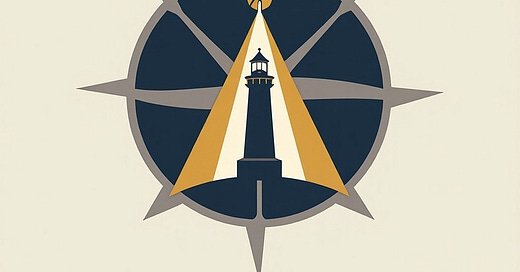Episode 2: The Habit of Dehumanization—and the Compass of Grace
Before it becomes a slur, a meme, a policy, or a punchline—dehumanization begins as something smaller. A flicker in the mind. A shortcut in the brain. A survival instinct passed down through generations. It's as old as the frontier, as old as fear itself.
We are tribal by nature. It’s how we survived—on the plains, in the wild, in war.
Who belongs, who doesn’t. Friend or threat. Safe or not.
In the beginning, this instinct kept us alive.
But instincts don’t always serve us well in a modern world. In a nation built on equality, these ancient reflexes can quietly become dangerous beliefs.
We start with difference.
We assign meaning to difference.
Then we fear the meaning we’ve assigned.
📺 Media tells us who to blame.
📣 Rhetoric stokes fear.
🗳️ Policy locks it in.
And before long, we’re not talking about people anymore. We’re managing threats. “Cracking down.” “Taking back control.” As if empathy were a luxury we can no longer afford.
But here’s the truth:
Fear is easy to sell when the buyer is already tired.
The more exhausted we become, the more we cling to shortcuts.
We follow the loudest voice. We accept the simplest answer.
And cruelty—if it promises control—can become comforting.
🧠 From Instinct to Indoctrination
Dehumanization isn’t just natural instinct.
It’s also learned behavior—indoctrinated slowly.
Passed down not in genes, but in jokes, headlines, slogans.
Normalized in churches, classrooms, campaign ads.
We’ve seen it before.
During every era of national stress, scapegoats emerge.
From enslaved persons to Japanese Americans, to Muslims after 9/11, to immigrants now—there is always a target.
📡 A Lesson from a Facebook Thread
I grew up in a town where people fixed their own fences, trusted their neighbors, and said what they meant. So when someone like Kelly—a 65-year-old woman with deep Wyoming roots—pushes back on a public post about empathy, I listen.
Here’s what she said:
“So, you don’t watch the news? It’s not a thought—it’s fact!!!”
That sentence stopped me.
Not because I disagreed. But because it said so much about where we are now—as a nation, as neighbors, as voters.
I couldn’t help but wonder if the “news” Kelly meant was a stream of curated outrage—what some call infotainment. Fear-forward. Empathy-light. What’s repeated becomes familiar. What’s familiar becomes true.
This isn’t just confusion.
It’s strategy.
When satire circulates—like a meme joking about alligators guarding border fences 🐊—we laugh. Or we don’t. But the shrug is what matters. The indifference.
That moment begins the work of dehumanization.
It’s not about defending criminals.
It’s about what happens when we assume an entire population is criminal by default—when fear and policy begin to speak louder than humanity and principle.
🗞️ Who Frames the Facts?
Kelly wasn’t trying to be cruel. She was repeating what she'd been told.
Cable news. Talk radio. Political ads.
They don’t just inform.
They frame.
“So you don’t watch the news?”
Translation: If you did, you’d see what I see.
Translation: The problem isn’t cruelty—it’s blindness.
Translation: Empathy is naïve.
The danger is not disagreement.
The danger is when disagreement gets coded as weakness, treason, or a lack of common sense.
🪞 A Mirror Moment
I responded with a few facts. I cited the criminal rate among undocumented immigrants—roughly equal to or lower than the national average. I tried to open a door:
“Do you have a personal story you’d like to share?”
But the response wasn’t engagement. It was rejection.
Why?
Because the narrative had already been decided.
The “us vs. them” story is cleaner. More comfortable.
And more dangerous.
🧭 Empathy Isn’t Optional
Another commenter, Mary, wrote:
“We can care for these criminals and feel empathy… They are behind bars for a reason.”
It was meant as balance. But even this language assumed criminality as default.
It surrendered the truth: Some are punished for presence, not violence. For existing, not harming.
I replied:
“Can I argue that the misdemeanor of being in the country is no more serious than filing your taxes late? Yet it carries the penalty of exile.”
This is the deeper issue: disproportionate punishment driven by fear.
When policy grows out of disdain, justice doesn’t follow. Injustice does.
🕊️ Where Grace Begins
Dehumanization doesn’t require a villain. It just needs repetition. And silence.
But we’ve been here before.
Lincoln saw it clearly:
A nation that denies the humanity of some cannot long uphold liberty for all.
That’s why the Compass of Grace matters.
It turns us back to first principles.
Not partisan ones—human ones.
So here’s the question:
When someone says, “It’s not a thought—it’s fact,” what do we do?
We don’t yell louder.
We ask better questions.
We invite stories.
And most of all, we refuse to forget that even those we disagree with are still our neighbors.
💬 “It begins as fear, becomes policy, then hardens into belief.”
And every step is a choice.💭 Dehumanization doesn’t need monsters. It only needs silence.
And grace doesn’t need permission. It only needs us.






Share this post